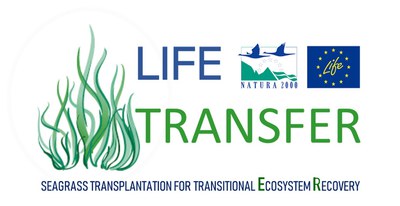LIFE-TRANSFER - Seagrass transplantation for transitional Ecosystem Recovery
 The project aims to improve the conservation status of habitat 1150* due to seagrass regression in eight Natura 2000 sites in three Member States: Italy, IT4060002; IT4060005; IT3270023; IT3270017; Greece GR2110001 GR2110004, Spain ES6200030, ES0000260. The specific objectives are:
The project aims to improve the conservation status of habitat 1150* due to seagrass regression in eight Natura 2000 sites in three Member States: Italy, IT4060002; IT4060005; IT3270023; IT3270017; Greece GR2110001 GR2110004, Spain ES6200030, ES0000260. The specific objectives are:
1. Restoring and consolidating priority habitat 1150* in 6 coastal lagoons, by transplanting submerged phanerogams to promote ecosystem self-sustainability and restoring water circulation in one lagoon; an area of 1000 m2 will be transplanted at each of the 6 lagoons with seagrass typical of that biogeographic area.
2. Contributing to achieve a good ecological state of transitional water demonstrating the effectiveness of the proposed actions to pursue the objectives set in the (WFD 2000/60/EC Art. 4);
3. Quantifying the value of ecosystem services provided by the lagoon environments and the seagrass meadows.
4. Training of future trainers in this techniques, targeting site managers/professional not participating to the project to ensure transferability and replicability in other sites.
The proposal aims to trigger the process of recolonization of aquatic phanerogams in the above mentioned lagoons through the transplanting of small sods and rhizomes of Z. marina, Z. noltei, R.cirrhosa and C. nodosa, for each lagoon the species previously present in that area, to promote the natural propagation capacity through seed production and dispersion. The intervention technique provides transplantation exclusively by hand with a reduced amount of material from donor sites, with advantages in terms of environmental impact, costs and of application on a larger scale. Furthermore seagrass meadows represent nursery for fish and feeding for birds, increase the stability of the tidal flats and sequester large amounts of CO2. Recent regulations (2000/60/EC and National Acts) have limited disturbance reducing eutrophication. However, if the seed bank is absent, or hydrodynamic circulation is limited, residual meadows are unable to "naturally" re-colonize. In one lagoon is foreseen also restoration of water circulation.
The proposal is the application of the results of LIFE SeResto (LIFE12 NAT/IT/000331) through the transplantation of submerged phanerogams at the Mediterranean level. Submerged phanerogams are recognized as priority for the conservation of coastal lagoons, and represent one of the most striking examples of organisms that deeply modify the biotope to be called "ecosystem engineers".
Notizie (in italiano)
- LIFE TRANSFER | Il progetto coordinato da Unife tra i 10 migliori del 2023 e protagonista di un documentario di EuroNews Channel
- Un reimpianto vegetale per migliorare le lagune del Mediterraneo
- Giornata europea di Rete Natura 2000 | La presentazione del progetto Life-Transfer per la salvaguardia delle lagune del Mediterraneo
Participants
- Università degli Studi di Ferrara, Italy - Coordinator
- Amvrakikos gulf – Lefkada Management Agency, Greece
- Comunidad Autonóma de la Región de Murcia - Consejería de Agua, Agricultura, Ganadería, Pesca y Medio Ambiente – Dirección General de Mar Menor, Spain
- Asociación Empresarial Centro Tecnológico de la Energía y del Medio Ambiente de la Región de Murcia, Spain
- Dept.of Environmental Sciences, Inf. and Stat., University Ca' Foscari Venice, Italy
- Ente di Gestione per i Parchi e la Biodiversità-Delta del Po, Italy
- Hellenic Centre for Marine Research, Greece
- Istituto Delta Ecologia Applicata srl, Italy
- Universidad de Murcia, Spain
- Ente Parco Delta del Po Veneto, Italy
